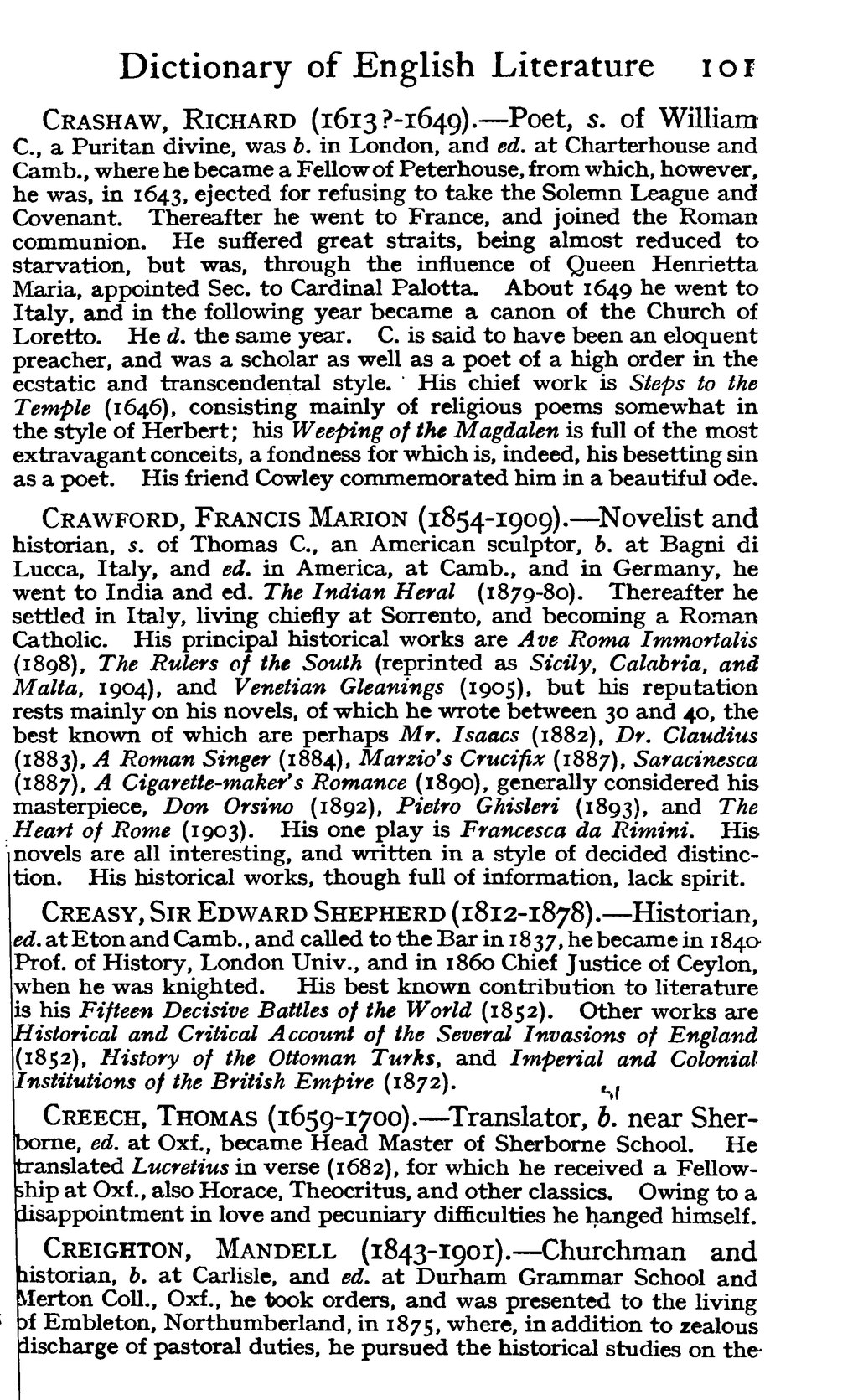Crashaw, Richard (1613?-1649).—Poet, s. of William C., a Puritan divine, was b. in London, and ed. at Charterhouse and Camb., where he became a Fellow of Peterhouse, from which, however, he was, in 1643, ejected for refusing to take the Solemn League and Covenant. Thereafter he went to France, and joined the Roman communion. He suffered great straits, being almost reduced to starvation, but was, through the influence of Queen Henrietta Maria, appointed Sec. to Cardinal Palotta. About 1649 he went to Italy, and in the following year became a canon of the Church of Loretto. He d. the same year. C. is said to have been an eloquent preacher, and was a scholar as well as a poet of a high order in the ecstatic and transcendental style. His chief work is Steps to the Temple (1646), consisting mainly of religious poems somewhat in the style of Herbert; his Weeping of the Magdalen is full of the most extravagant conceits, a fondness for which is, indeed, his besetting sin as a poet. His friend Cowley commemorated him in a beautiful ode.
Crawford, Francis Marion (1854-1909).—Novelist and historian, s. of Thomas C., an American sculptor, b. at Bagni di Lucca, Italy, and ed. in America, at Camb., and in Germany, he went to India and ed. The Indian Herald (1879-80). Thereafter he settled in Italy, living chiefly at Sorrento, and becoming a Roman Catholic. His principal historical works are Ave Roma Immortalis (1898), The Rulers of the South (reprinted as Sicily, Calabria, and Malta, 1904), and Venetian Gleanings (1905), but his reputation rests mainly on his novels, of which he wrote between 30 and 40, the best known of which are perhaps Mr. Isaacs (1882), Dr. Claudius (1883), A Roman Singer (1884), Marzio's Crucifix (1887), Saracinesca (1887), A Cigarette-maker's Romance (1890), generally considered his masterpiece, Don Orsino (1892), Pietro Ghisleri (1893), and The Heart of Rome (1903). His one play is Francesca da Rimini. His novels are all interesting, and written in a style of decided distinction. His historical works, though full of information, lack spirit.
Creasy, Sir Edward Shepherd (1812-1878).—Historian, ed. at Eton and Camb., and called to the Bar in 1837, he became in 1840 Prof. of History, London Univ., and in 1860 Chief Justice of Ceylon, when he was knighted. His best known contribution to literature's his Fifteen Decisive Battles of the World (1852). Other works are Historical and Critical Account of the Several Invasions of England (1852), History of the Ottoman Turks, and Imperial and Colonial Institutions of the British Empire (1872).
Creech, Thomas (1659-1700).—Translator, b. near Sherborne, ed. at Oxf., became Head Master of Sherborne School. He translated Lucretius in verse (1682), for which he received a Fellowship at Oxf., also Horace, Theocritus, and other classics. Owing to a disappointment in love and pecuniary difficulties he hanged himself.
Creighton, Mandell (1843-1901).—Churchman and historian, b. at Carlisle, and ed. at Durham Grammar School and Merton Coll., Oxf., he took orders, and was presented to the living of Embleton, Northumberland, in 1875, where, in addition to zealous discharge of pastoral duties, he pursued the historical studies on the
